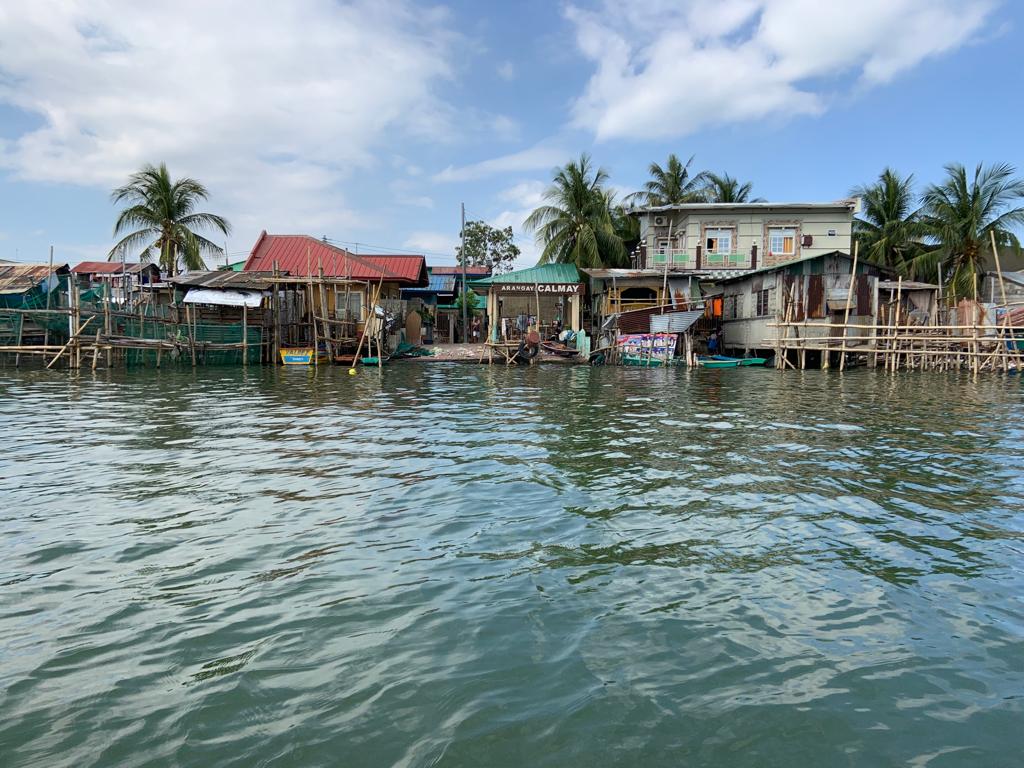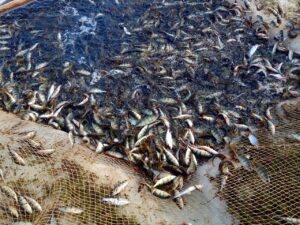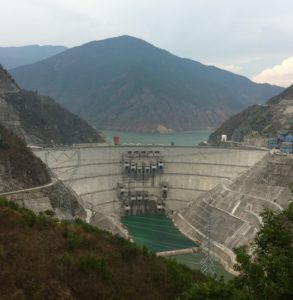Dagupan City Tour – February 15, 2023
On February 15, 2023, members of the Dagupan city government took the project team on a tour of the City of Dagupan. The first stop on the tour was the Pantal River with its island barangays of Dagupan City, milkfish (bangus) pens, oyster pens, shrimp hatchery, mangroves, wet market, and dredging vessels. The team saw how dredged silt and sand from the river are repurposed and given for free as construction materials to the locals of Dagupan. While on the river, the river watch task force shared how they regularly monitor the fish pens along the waterways to prevent overstocking, overcrowding and illegal fishing.

After the Pantal River, the team visited Tondaligan Beach, which Mayor Belen Fernandez plans to develop as an ecotourism and surfing destination. This visit included a look at the open dumpsite along the beach, a stark demonstration of the challenges that Dagupan has with waste management, especially plastic. The same site, however, demonstrates the creative thinking around this issue: Located alongside the dumpsite is the city’s composting facility, which converts biodegradable waste from the wet market into compost to be given to farmers. A new partnership between the local government and Sure Global Waste to Worth Innovations is working to install a waste-to-energy facility that can convert garbage into diesel fuel and methane gas, which local fishermen can use as a substitute for diesel to fuel their boats.
The tour, which was led by Ronald de Guzman, the Head of the City Disaster Risk Reduction and Management Office Head (CDRRMO); Bernard Cabison, Head of Waste Management Division under the Mayor’s Office, and Abel Abueme, Task Force Bantay Ilog Leader greatly increased the project team’s understanding of the key risks faced by Dagupan.

Briefing with Mayor Belen Fernandez – February 16, 2023 – Dagupan Mayor’s Office
On February 16, 2023, the Ocean Policy Research Institute-Sasakawa Peace Foundation (OPRI-SPF), Stimson Center, and Ecosensya Solutions teams met with Mayor Belen Fernandez and her team for a briefing to discuss the results of the study and how the recommendations can be integrated into Mayor’s plans for the City. Additional members joining the team were from OPRI-SPF, as represented by their president Dr. Hide Sakaguchi and Dr. Santosh Kumar Rauniyar, as well as Ecosensya President Queenie Cunanan.

During the meeting, Tracy Rouleau took the lead in discussing the CORVI report findings and priority recommendations, as well as additional information obtained from locals during the previous day’s tour. The recommendations presented mainly touched on coordination and planning between regional and local governments, improving water quality and water supply, and the promotion of sustainable tourism, aquaculture and fisheries to safeguard their blue economy. Mayor Fernandez also took the opportunity to share with the meeting attendees her long-term vision for One Bonuan, an initiative with the objective of enhancing tourism, commerce, and employment for three barangays: Barangays Bonuan Guest, Bonuan Binloc, and Bonuan Boquig.
CORVI Conference – February 17, 2023 – Star Plaza Hotel, Dagupan
On February 17, 2023, the Dagupan climate vulnerability assessment using Stimson Center’s Climate and Ocean Risk Vulnerability Index (CORVI) was first released to the public through a conference entitled “CORVI ‘23: Building Climate Resilience and a Sustainable Blue Economy for Dagupan City.” The conference, held in Star Plaza Hotel, was attended by members of the national, regional and local government, civic societies, academe, business sector, and fisheries and aquaculture sector.
Mayor Belen Fernandez kickstarted the conference with her opening remarks, mentioning that it had been quite some time since the City had an event like this, and that it was very important that all participants learn from and be made aware of the relevant research data that will impact their lives and future. Dr. Hide Sakaguchi stood at the podium to express his gratitude towards everyone who worked to make the research successful. He mentioned how he learned about the city’s problems with heavy rains, flooding, water shortage and its mountains of waste, and stressed the importance of collaborating together to curb the effects of climate change on the people of Dagupan. He also highlighted the great potential the city has, especially for tourism and aquaculture.

The program was moderated by Ryan Ravanzo, the Secretary of the City Council, and Queenie Cunanan. Sally Yozell first gave an introduction to CORVI: Namely, how it was developed as a response to economic, social, and environmental vulnerabilities and is designed to provide cities with internationally-recognized data that they can use to unlock adaptation finance from various entities through this report. This was followed by Tracy Rouleau’s presentation of the CORVI findings and recommendations.
After the presentations, a joint Q&A session and press conference covered by local radio and news stations was held to address any questions the audience had regarding the results and its implications on the city. Questions raised revolved around how this report can tie in together with the City’s Local Climate Change Adaptation Plan, how earthquakes fit in the context of the report, and what are the next steps that should be taken after this. The questions were answered by members of the panel, namely Mayor Belen Fernandez, Dr. Hide Sakaguchi, Dr. Santosh Kumar Rauniyar, Sally Yozell, Tracy Rouleau, and Queenie Cunanan.

Next Steps
Throughout the duration of the event, the team received positive feedback regarding the findings and recommendations of the CORVI Dagupan vulnerability assessment, particularly mentioning how the results validate residents’ own experiences. The Dagupan City mayor communicated that local government plans will be adjusted to take into consideration the findings of the report and will incorporate recommendations that were presented.
Key Findings & Recommendations from CORVI Dagupan
Dagupan City, located in the Province of Pangasinan in the Ilocos region of Luzon Island, is a coastal city perhaps best known as the Bangus Capital of the Philippines. It has 171,271 inhabitants, and its population is growing. The city has a geographic land area of 40 square kilometers covered by an expansive network of seven rivers, making up 14 percent of its total land area. Notable sources of vulnerability include:
- Risks from historic perennial flooding due to the city’s location over the lower reaches of the Pantal River and as a catch basin for three river tributaries from neighboring cities. Dagupan is predisposed to high risks of flooding and liquefaction because of its low topography, location on a river delta, and the extensive seven-river system.
- Water security, including potential threats to drinking water supply from changes in climate patterns. Extreme weather events, including typhoons and warming coastal waters, which have recently caused rice crops to die off, diminished the yield of locally grown water spinach (kang kong), and resulted in the drying of artesian wells, a key source of drinking water.
- Limited solid waste and wastewater infrastructure and residential sanitation services. With no sewage treatment facility or sanitary landfill yet in place, debris and water pollution from informal river dumping of household waste and from the fishing industry pose risks to human health and the economy, via clogged canals, increased flooding, land subsidence, and the contamination of milkfish.
- Degraded coastal, marine, and riverine ecosystems, and the marine life that depend on them are vulnerable due to the loss of mangroves, overfishing, overstocking, a proliferation of illegal fish pens/cages, and urban water pollution. These vulnerabilities affect not only fishing activities, but also related businesses, such as fish processing, fish pens, cages, processing facilities, and wet markets — as well as the people these businesses employ.
Priority Recommendations
- Institutionalize climate resiliency project planning and implementation to address the long-term nature of climate risk, the Office of the Mayor and the Dagupan City Council should work together to pass laws, ordinances, and multiyear planning budgets that codify and institutionalize sustainable infrastructure and renewable energy projects into law.
- Implement local nature-based solutions for wastewater treatment and groundwater recharging in vulnerable communities to improve water quality and supplies of clean drinking water. Local solutions using natural materials for wastewater treatment can be inexpensive and efficient, and could be used to treat wastewater in local barangays prior to the rollout of the sewage treatment plant and to recharge groundwater supplies.
- Improve the sustainability and diversity of the city’s blue economy industries to ensure climate resilience. Alongside existing resident education and mangrove restoration efforts, Dagupan should continue to diversify its coastal tourism industry. For example, opportunities may exist to develop sustainable tourism, and ecotourism businesses along the beachfront on the Lingayen Gulf.




